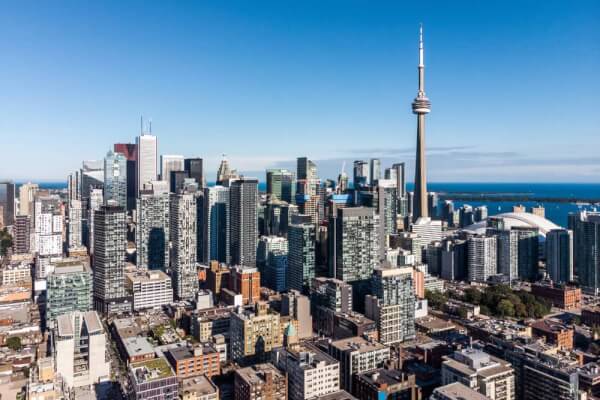How Canada citizenship by investment works
Thinking of applying for a Canadian passport? Read our guide on the Canada citizenship by investment programme, including the requirements, costs and benefits.

Canada has a globally welcoming reputation and draws expats and tourists from all corners of the globe. With a developed economy, there are plenty of opportunities to pursue your career, as well as getting to experience some of the best outdoor living the planet can offer. Throw in friendly people, a vibrant cultural life and some great cosmopolitan cities, and there’s certainly plenty to like.
If you’re planning on staying in Canada in the long term, then instead of sticking with your permanent residence status, you might have thought about becoming a Canadian citizen instead. This gives you the chance to ‘join the Canadian family’ and hold one of the globe’s most powerful passports. You might not even need to give up your current nationality to do so.
So, whether you’re just thinking about getting a work visa in Canada or you’re an expat already living there, it’s good to know your options when it comes to switching your visa or permit, for permanent Canadian citizenship. Here’s a quick guide.
Citizens of Canada have different rights (and responsibilities) to migrants holding permanent residence. For example, one benefit of being a Canadian citizen is that you can vote and be elected yourself, in Canadian elections. You can also apply for a Canadian passport, which allows visa free travel in and out of the country. The Canadian passport, in fact, allows you to go visa free to 155 countries, making it one of the most powerful passports in the world - reason enough to consider switching up to citizenship of Canada.
You canapply for Canadian citizenship if you fulfil certain requirements, which are clearly set out on the Canadian government website. Aside from the routes outlined below, there’s an expedited route to citizenship for those who have served in the Canadian armed services, and also a different process for people seeking humanitarian support in Canada.
Regardless of the route you’re applying to, you have to fulfil certain basic requirements to be eligible. To apply for yourself, you must be over 18 years old, have Canadian Permanent Resident (PR) status, have filed your income taxes correctly as a PR, be able to speak one of the official languages of Canada and understand the culture and laws of the land.
There are also strict residence rules governing who is eligible to apply, meaning in effect you must have been a PR for four of the previous six years, and have been actually present in the country for a fixed number of days over that time. However, this calculation is somewhat complex, and so there’s a calculator to help you determine if you’re eligible to apply to become a Canadian citizen based on your previous residency.
To prove you meet the language requirements you’ll have to demonstrate your knowledge of English or French. You can submit a range ofdocuments as proof, which are detailed on the government website.
Applications for Canadian citizenship are managed by the Canadian immigration department, and the government’s immigration ‘Help Centre’ website is a great place to look for process details and application forms.
It’s possible to be a citizen of Canada, as well as of another country, known as dual citizenship. However, whether this is possible for you depends on your individual circumstances. Although Canada won't make you renounce any particular citizenship to take up your new offer of Canadian citizenship, some countries won't allow this, and you may be forced to choose.
If you're in any doubt, talk to an immigration lawyer or your local embassy.
Depending on your personal circumstances there are several different ways you can claim Canadian citizenship.
The rules for citizenship vary slightly for children under the age of 14 and for people over the age of over 64. If you have any doubt which is the right route for you, it’s worth talking to an immigration lawyer who can guide you through the process.
There’s no direct route to citizenship through investment in Canada. If you’re an investor or entrepreneur, you may find that you have more routes open to you to get a work visa and PR status, but you’ll still have to fulfil the residency requirements before your application for citizenship could be considered.
You can become aCanadian citizen through descent if at least one of your parents was a Canadian citizen when you were born. However, this rule is only applied to the first generation, meaning it can only be conferred by parents, not grandparents, as is common in other countries.
There are, however, some exceptions if your parents or grandparents were Canadian government employees or in the armed forces - if this is the case it's worth looking at your options with an immigration lawyer, or talking to your embassy for more personal advice.
There’s no specific route to become aCanadian citizen through marriage. You’ll have to fulfil the same criteria as any other adult applying, and follow one of the routes laid out above, such as achieving citizenship through meeting residence requirements.
One advantage you do have, however, is that your marriage could work in your favour when it comes to proving your intent toreside in Canada after becoming a citizen - something all applicants must demonstrate somehow.
The basic route for applying for citizenship is the same, whatever the grounds for your application. It’s a good idea to check you’re eligible to apply using the tools available on the Canadian government website, then collect the documents needed for your application.
You’ll have to create an account on the government site and download the relevant forms. All the forms and your document pack should be completed and sent to the central processing centre in Nova Scotia. In most cases, as part of your application being processed, you‘ll have to attend a citizenship test.
Once your application is approved, you can attend aCanadian citizenship ceremony, and make an oath of citizenship. This stage is described as being ‘welcomed into the Canadian family’.
You’ll need to submit your application, and pay the fees. Once you have approval, you can make an appointment for a citizenship test or interview if this is needed.
Fees are payable for all routes to citizenship, although there are concessions available under some circumstances. The full range of fees are available on the government website, but it’ll currently set you back CAD 530 for an adult application for Canadian citizenship, and CAD 100 for anyone under the age of 18.
If you’re applying from abroad and need to make an international money transfer, your bank might charge over the odds, using a poor exchange rate and adding in administration fees. A better option, if you have a Canadian bank account, or know someone who does, is to useTransferwise, and have your transfer processed using the real exchange rate with only a small transparent fee.
If you’re between 14 and 64 years of age when you make your application to become a Canadian citizen, then you’ll have to show you know about Canada’s history, culture and laws, through passing a citizenship test. Usually this is a written test, but it can sometimes be carried out in the form of an interview with a citizenship officer. Everything you need to know to pass your citizenship test is available online in a handy booklet provided by the Canadian government.
The processing time for your citizenship application depends on your personal circumstances. You can track the process of your application, and get an approximate timescale, on the government website. You should be prepared, however, for a wait. At the time of research (April 2017), an application for citizenship could take up to 12 months to be fully processed.
Once your citizenship is arranged, you canapply for a Canadian passport. You‘ll need to complete the application forms, find the relevant documents, and submit them either in person or by mail.
As getting a passport is a separate process from getting your citizenship, there are further fees to pay. You can expect to pay around CAD 160 for a passport, or more if you need to get your documents quickly. There are specific rules about payment and some passport offices can’t accept cash. You’ll have to pay with a card or a certified bank cheque or money order instead, and all payments, naturally, must be made in local currency.
Therefore, if you’re not already familiar with money and banks in Canada, you’ll want to do a bit of research. And, if you haven’t already, now’s the time to open a bank account to help cut down on costs.
Dealing with the authorities is rarely fun - wherever in the world you are - but it will all be well worth it when you get your new citizenship and passport. If you’re just starting out on your journey to becoming a Canadian citizen, then at least you can be assured of a really warm welcome once your paperwork is all processed.
Good luck on becoming a Canadian citizen!
*Please see terms of use and product availability for your region or visit Wise fees and pricing for the most up to date pricing and fee information.
This publication is provided for general information purposes and does not constitute legal, tax or other professional advice from Wise Payments Limited or its subsidiaries and its affiliates, and it is not intended as a substitute for obtaining advice from a financial advisor or any other professional.
We make no representations, warranties or guarantees, whether expressed or implied, that the content in the publication is accurate, complete or up to date.

Thinking of applying for a Canadian passport? Read our guide on the Canada citizenship by investment programme, including the requirements, costs and benefits.

The Great White North is a popular destination for tourists from all over the world, as well as expats. With its progressive politics, stunning natural...

Your essential guide to moving to Canada from the UK, including visas, money, finding a place to live and more.

The cost of living in Canada varies widely from region to region. This 2020 guide outlines what you can expect in terms of living costs.

The essential guide to the working holiday visa Canada, including eligibility, how to apply and everything else you need to know.

A complete guide to the open work permit in Canada, covering the requirements, fees and processing time, as well as how to renew your permit.